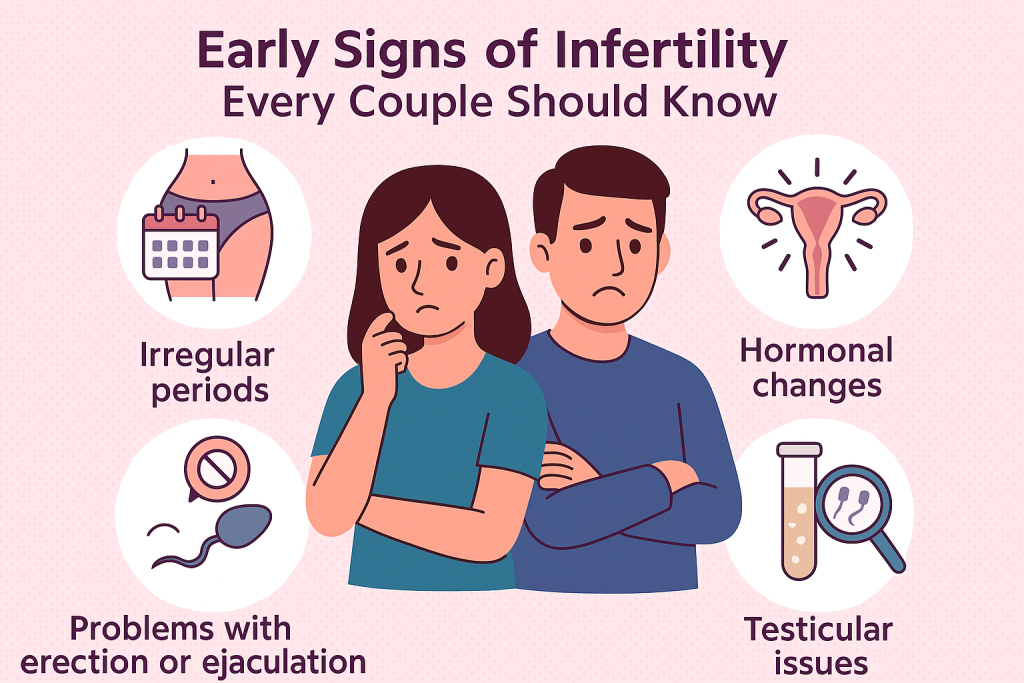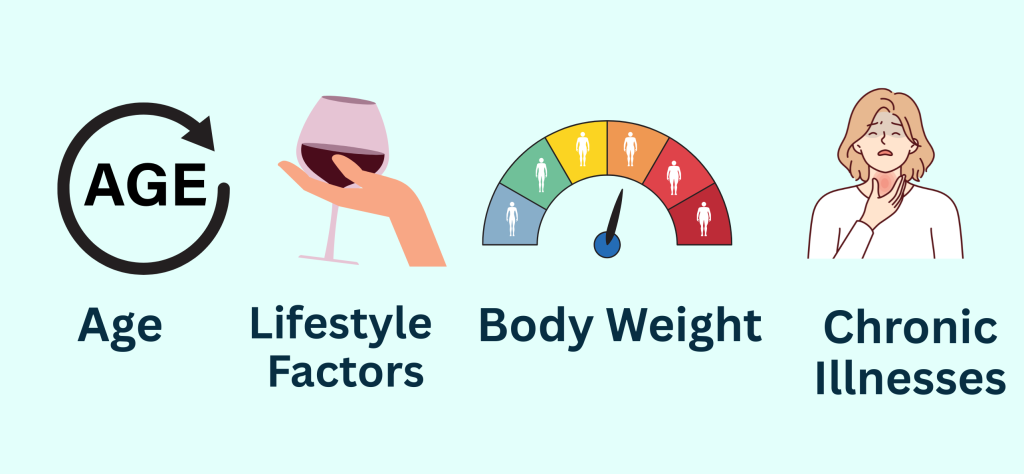How to Identify Early Signs of Infertility: A Guide for Couples
Infertility is a condition that affects approximately 17.5% of adults globally (WHO, 2023), making it a common struggle for many couples. If you’ve been trying to conceive without success, recognizing the early signs of infertility is critical. For both men and women, early symptoms such as irregular periods, low sperm count or hormonal imbalance can point to underlying fertility issues.
At Lakshmi Fertility Centre in Karaikudi, we provide world-class diagnostic and treatment options to help you navigate this journey. Understanding these early warning signs and knowing when to seek medical help is essential to improving your chances of conception and achieving a successful pregnancy.

Understanding Infertility
Infertility is the inability to achieve pregnancy after 12 months of regular, unprotected intercourse (WHO). It can be caused by factors related to one or both partners. Understanding infertility’s causes and recognizing symptoms early can provide an opportunity for treatment before it impacts your chances of becoming parents.
Causes of Infertility
Ovulatory Disorders
Ovulatory disorders prevent the release of eggs from the ovaries, making it challenging for conception to occur. Common conditions include:
- Polycystic Ovary Syndrome (PCOS): Causes hormonal imbalances, leading to irregular periods and ovulatory dysfunction (PCOS Information).
- Hypothalamic Dysfunction: Stress, weight loss or excessive exercise can disrupt hormonal control over ovulation.
- Hyperprolactinemia: Elevated prolactin levels suppress ovulation, interfering with the menstrual cycle and conception.
Fallopian Tube Damage or Blockage
Blocked or damaged fallopian tubes prevent eggs from reaching the uterus for fertilization. Causes include:
- Pelvic Inflammatory Disease (PID): Often caused by untreated STIs, leading to scarring and tubal blockages.
- Endometriosis: Uterine-like tissue growing outside the uterus can cause adhesions and block the fallopian tubes (Endometriosis Overview).
- Previous Surgeries: Surgery on reproductive organs can leave scars that impede fallopian tube function.
Endometriosis
Endometrial tissue that grows outside the uterus can lead to pain, scar tissue and cysts that interfere with ovulation and fertilization. It is one of the major causes of infertility in women.
Male Factor Infertility
Male infertility contributes to 40-50% of infertility cases. Common causes include:
- Low Sperm Count: Often due to hormonal imbalances or environmental factors.
- Poor Sperm Motility: Sperm struggles to swim towards the egg, hindering fertilization.
- Varicocele: Enlarged veins in the scrotum raise temperatures that impair sperm production.
- Ejaculation Disorders: Conditions like retrograde ejaculation reduce the chances of sperm entering the female reproductive tract (Male Infertility Overview).
Risk Factors for Infertility

Age
Both male and female fertility declines with age, but the effects are more pronounced in women after the age of 35. As fertility naturally decreases, women may consider treatments like IVF or egg freezing.
Lifestyle Factors
Poor lifestyle choices can contribute to fertility problems:
- Smoking: Damages eggs and sperm, causing early menopause in women and low sperm count in men (Smoking and Fertility).
- Excessive Alcohol Intake: Disrupts hormone balance and ovulation.
- Drug Use: Both recreational drugs and medications can impair fertility.
Body Weight
Both being underweight and overweight can hinder fertility. Maintaining a healthy body weight improves ovulation and hormone function, which are key to conception.
Chronic Illnesses
Conditions such as diabetes, thyroid disorders and autoimmune diseases can affect reproductive health. Proper management of these conditions can help preserve fertility.
Early Signs of Infertility in Women
1. Irregular Menstrual Cycles
Irregular periods may suggest ovulation issues. A healthy cycle typically lasts between 21 to 35 days. Significant changes could indicate that ovulation is not occurring regularly, which affects fertility.
2. Painful or Heavy Periods
Excessive bleeding or severe cramps can point to underlying issues like fibroids or endometriosis, which interfere with sperm-egg fertilization and embryo implantation.
3. Absence of Menstruation (Amenorrhea)
A sudden stop in menstruation or missed periods without pregnancy could indicate hormonal issues or ovarian dysfunction, both of which can impact fertility.
4. Pain During Intercourse (Dyspareunia)
Pain during intercourse may be linked to conditions like endometriosis or pelvic inflammatory disease (PID), which can hinder fertility by causing internal damage.
5. Hormonal Imbalances
Excess facial hair, unexplained weight gain, severe acne or thinning hair may point to PCOS or other hormonal disorders that disrupt ovulation.
Early Signs of Infertility in Men
1. Changes in Sexual Function
Decreased libido or difficulty maintaining an erection could indicate low testosterone levels, which affect sperm production and fertility.
2. Testicular Pain or Swelling
Pain, swelling or lumps in the testicles may be caused by infections, varicocele or tumors, all of which can affect sperm production.
3. Ejaculation Issues
Problems such as delayed ejaculation or retrograde ejaculation (where semen enters the bladder) can prevent sperm from reaching the egg, leading to infertility.
4. Small or Firm Testicles
Abnormalities in testicle size or texture may suggest hormonal imbalances or genetic conditions such as Klinefelter syndrome, which affect sperm quality.
Global Infertility Statistics
- According to the World Health Organization, 17.5% of adults globally or 1 in 6 people are affected by infertility during their lifetime.
- In the U.S., approximately 9% of men and 11% of women experience fertility issues, as noted by the National Institute of Child Health and Human Development.
- Both male and female partners contribute equally to infertility, highlighting the importance of evaluating both individuals, as emphasized by the World Health Organization.
When to Seek Medical Advice
Couples should seek medical advice if:
- They’ve been trying to conceive for over 12 months without success (for women under 35).
- They’ve been trying for 6 months without success (for women over 35).
- They are aware of conditions like PCOS, endometriosis or irregular periods.
- Men experience ejaculation problems or low libido.
The Emotional Impact of Infertility
Infertility can lead to emotional distress, affecting mental health and relationships:
- Stress and Anxiety: The pressure to conceive can overwhelm couples, especially during fertility treatments.
- Relationship Strain: Fertility issues may cause guilt, blame or breakdowns in communication.
- Depression: Infertility has been linked to depression in up to 40% of affected women (Psychiatry.org).
Support services such as counseling, support groups and mindfulness can help couples cope with the emotional impact of infertility.
How Lakshmi Fertility Centre Can Assist
Comprehensive Assessments
Lakshmi Fertility Centre in Karaikudi offers a full range of diagnostic services:
- Hormonal Testing: Blood tests to assess estrogen, progesterone and other hormones.
- Ultrasound Imaging: Evaluation of the uterus, ovaries and fallopian tubes.
- Semen Analysis: Checks sperm count, motility and morphology.
Personalized Treatment Plans
Treatment options are tailored to the specific diagnosis:
- Ovulation Induction: Medications to stimulate egg release.
- Intrauterine Insemination (IUI): Direct sperm placement during ovulation.
- In Vitro Fertilization (IVF) and Intracytoplasmic Sperm Injection (ICSI): Advanced treatments for complex cases.
Support Services
The center also offers emotional and lifestyle support:
- Psychological Counseling: Helps manage stress during treatment.
- Nutritional Advice: Offers diet plans to enhance reproductive health.
- Lifestyle Modifications: Guidance on exercise and habits to improve fertility.
Frequently Asked Questions
1. What are common signs of infertility in women?
Irregular periods, absence of menstruation, pain during intercourse and hormonal symptoms like facial hair growth.
2. What are common signs of infertility in men?
Ejaculation problems, low libido, testicular pain and abnormal sperm characteristics.
3. When should a couple seek medical advice for infertility?
After 12 months (under 35) or 6 months (over 35) of trying without success.
4. What treatments are available at Lakshmi Fertility Centre?
Treatments range from medications to advanced procedures like IVF and ICSI.
5. Are emotional effects of infertility common?
Yes, many experience depression, anxiety and relationship challenges.
Conclusion
Infertility can be a deeply emotional and complex journey but identifying the early signs can make all the difference. Whether it’s irregular cycles, hormonal imbalances or sperm-related issues, timely intervention plays a crucial role in achieving parenthood. At Lakshmi Fertility Centre in Karaikudi, we’re committed to helping couples overcome fertility challenges with advanced medical solutions and heartfelt support.
Don’t wait – schedule your consultation today and take the first step toward building your family.
